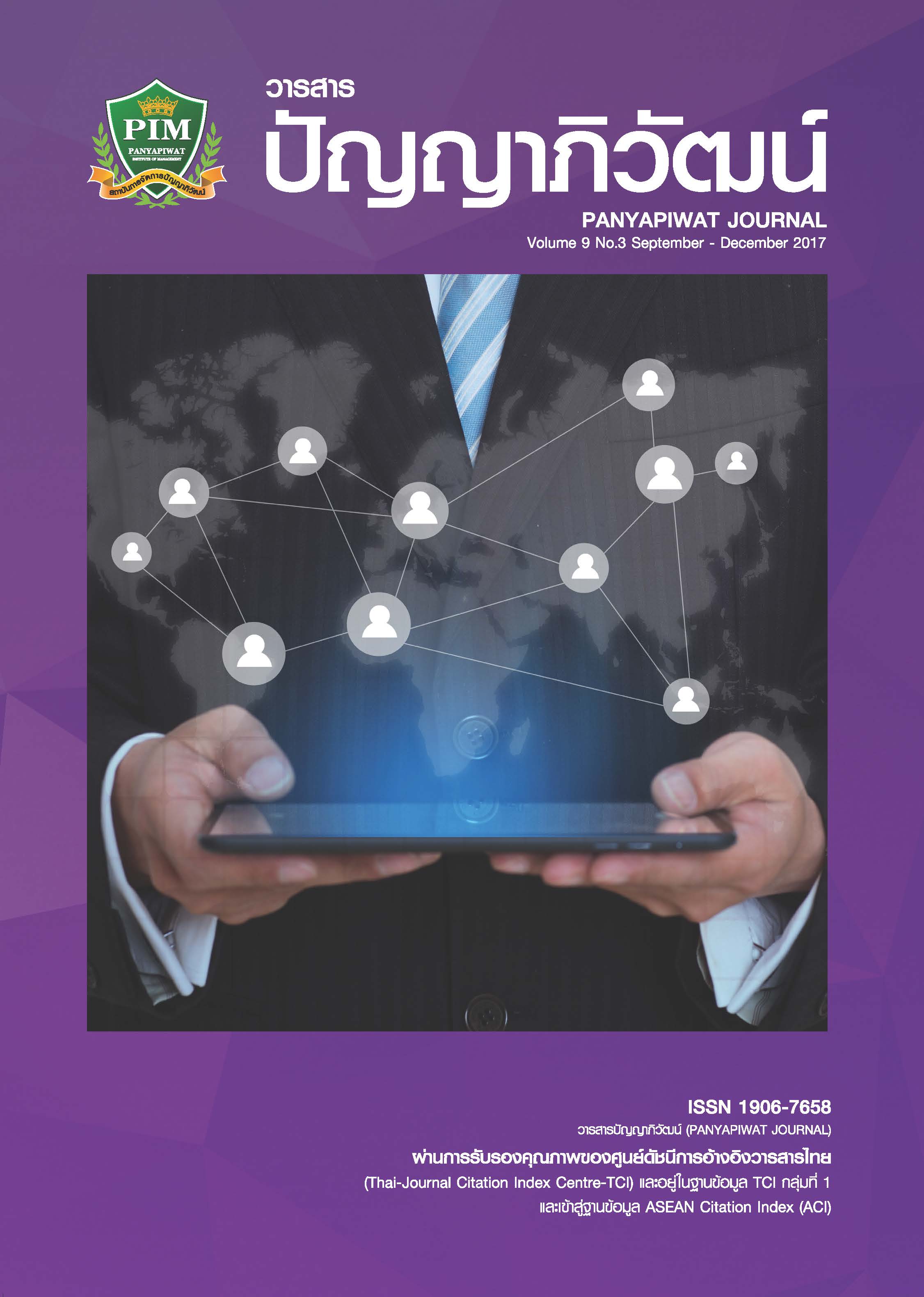การพัฒนาการเรียนรู้แบบบูรณาการควบคู่การทำงานด้วยนวัตกรรมการสอนแบบใหม่ กรณีศึกษารายวิชาการดำเนินงานและการจัดการธุรกิจอาหารและเครื่องดื่ม คณะการบริการและการท่องเที่ยว มหาวิทยาลัยสงขลานครินทร์ วิทยาเขตภูเก็ต
Main Article Content
บทคัดย่อ
บทความเชิงวิชาการนี้นำเสนอรูปแบบการจัดการเรียนการสอนแบบบูรณาการควบคู่การทำงานด้วยนวัตกรรมการสอนแบบใหม่ผ่านรายวิชาการดำเนินงานและการจัดการธุรกิจอาหารและเครื่องดื่ม โดยกำหนดให้นักศึกษาจำหน่ายอาหารและเครื่องดื่มในมหาวิทยาลัย นักศึกษาบูรณาการองค์ความรู้เชิงวิชาการจากรายวิชาต่างๆ ประสบการณ์ฝึกงาน ใช้วางแผนการดำเนินการและบริหารจัดการร้านอาหาร ผลการจัดการเรียนการสอนพบว่า นักศึกษาสามารถแสดงศักยภาพในการดำเนินงานเป็นทีม ลงมือปฏิบัติจริงด้วยความเข้าใจหลักบริหารจัดการร้านอาหารพื้นฐานได้ในระดับที่ดี ความร่วมมือของนักศึกษา อาจารย์ สาขาวิชา มีส่วนสนับสนุนให้เกิดนวัตกรรมการสอนรูปแบบใหม่ของคณะฯ แต่กระบวนการจัดการเรียนการสอนยังมีข้อจำกัดเพราะโครงสร้างรายวิชากำหนดให้สอนเชิงทฤษฎีอย่างเดียว ทำให้นักศึกษาต้องลงทะเบียนเรียนหลายวิชาต่อภาคการศึกษาส่งผลให้ภาระงานขาดความสมดุล และไม่สามารถทุ่มเทให้กับทีมได้เต็มความสามารถ ดังนั้น คณะฯ สาขาวิชา ฝ่ายสนับสนุนวิชาการ และผู้สอน ควรมีการวางแผนร่วมกันเพื่อนำไปสู่การแก้ไขปัญหา และคณะฯ ควรมีการบูรณาการร่วมกับกลุ่มวิชาชีพเฉพาะเลือกไมซ์และกลุ่มวิชาการจัดการธุรกิจท่องเที่ยว เพื่อเพิ่มโอกาสการบูรณาการข้ามสาขา เกิดประสบการณ์และมุมมองการทำงานในอนาคตที่กว้างเพิ่มมากขึ้น ดังนั้นการสอนแบบบูรณาการควบคู่การทำงานช่วยส่งเสริมการเรียนรู้ตลอดชีวิต การแบ่งปันความรู้ ประสบการณ์ สู่การพัฒนาทรัพยากรมนุษย์สาขาการบริการอย่างมีคุณภาพและยั่งยืน
This academic article presents the development of integrated learning together with a new teaching innovation via the Food and Beverage Business Operations and Management Course. The students were assigned to sell food and beverages within the university campus. They had to integrate their theory-based knowledge from other courses with their practicum experiences in order to plan for the operations and management of the restaurant. Results of the instructional management indicate that students can demonstrate their potentials via the use of good teamwork and undertake actual practices with the understanding of the principle of restaurant management at the good level. The cooperation of students, instructors, and the department contributes to create a new teaching innovation of the Faculty. However, the instructional management process still has some limitations because the structure of the course requires that it must be a theoretical course only. As a result, the students had to register for many courses in the semester resulting in the imbalance of their work requirement that prevented them from putting their full efforts for the team. Therefore, the Faculty, the Department, the academic supporting staff and the instructors should plan together for solving the problem and increasing the opportunities for interdisciplinary integration in order to create the wider working experience and viewpoint in the future. In conclusion, work integrated learning will promote lifelong learning, knowledge and experience sharing that will lead to sustainable development of quality human resource in the hospitality industry.
Article Details
“ข้าพเจ้าและผู้เขียนร่วม (ถ้ามี) ขอรับรองว่า บทความที่เสนอมานี้ยังไม่เคยได้รับการตีพิมพ์และไม่ได้อยู่ระหว่างกระบวนการพิจารณาลงตีพิมพ์ในวารสารหรือแหล่งเผยแพร่อื่นใด ข้าพเจ้าและผู้เขียนร่วมยอมรับหลักเกณฑ์การพิจารณาต้นฉบับ ทั้งยินยอมให้กองบรรณาธิการมีสิทธิ์พิจารณาและตรวจแก้ต้นฉบับได้ตามที่เห็นสมควร พร้อมนี้ขอมอบลิขสิทธิ์บทความที่ได้รับการตีพิมพ์ให้แก่สถาบันการจัดการปัญญาภิวัฒน์หากมีการฟ้องร้องเรื่องการละเมิดลิขสิทธิ์เกี่ยวกับภาพ กราฟ ข้อความส่วนใดส่วนหนึ่งและ/หรือข้อคิดเห็นที่ปรากฏในบทความข้าพเจ้าและผู้เขียนร่วมยินยอมรับผิดชอบแต่เพียงฝ่ายเดียว”
เอกสารอ้างอิง
Anugtanatkul, K. (2013). Qualification of Tourism and Hotel Graduates according to Thailand Qualifications Framework for Higher Education.Doctoral dissertation, Faculty of Liberal Arts, Rajamangala University of Technology Thanyaburi. [in Thai]
Canwang, P. (2015). What is Teaching Innovation? Retrieved February 6, 2017, from https://noompaiboon.blogspot.com/2015/09/blog-post.html [in Thai]
Chaiyasain, C. (2017). Learning and Teaching Innovation to Develop Students through Restaurant Entrepreneur A Case Study: 4th year Students’ Food and Beverage Business Operations and Management Subject, Faculty of Hospitality and Tourism, Prince of Songkla University Phuket Campus. Workshop “University’s Social Engagement & Work-Integrated Learning Initiatives”. 24-26 March 2017. [in Thai]
Cooper, L., Orrell, J. & Bowden, M. (2010). Work integrated learning: A guide to effective Practice. UK: Routledge.
Franz, J. M. (2007). Work integrated learning for design: A scholarship of integration. In Zehner, Robert (Ed.). ConnectED Conference on Design Education 2007, 9-12 July 2007, Australia, Sydney.
Janchai, N. et al. (2015). Evaluation of Graduates’ Quality on Tourism and Hospitality Industry Programme based on Thailand Qualification Framework on Higher Education B.E. 2552.SDU Research Journal Humanities and Social Sciences, 11(1), 181-196. [in Thai]
Kanchanapiboon, K. & Phoemphian, T. (2016). Practical Guidelines on Work-Integrated Learning According to the Desirable Characteristics of the Students in Bachelor Degree of Business Administration and the Enterprises’ Needs. Panyapiwat Journal, 8(3), 165-177. [in Thai]
Kramer, M. & Usher, A. (2011). Work-integrated learning and career-ready students: Examining the evidence. Higher Education Strategy Associates.
Marchoo, W. (2017). Work-Integrated Learning (WIL) of Tourism Business Management Program, Prince of Songkla University, Surat Thani Campus. Workshop “University’s Social Engagement & Work-Integrated Learning Initiatives”. 24-26 March 2017. [in Thai]
McLennan, B. & Keating, S. (2008). Work-integrated learning (WIL) in Australian universities: The challenges of mainstreaming WIL. In ALTC NAGCAS National Symposium (pp. 2-14).
Panich, V. (2012). 21st Century Students. Retrieved January 21, 2017, from https://fda.sut.ac.th/doc-training/budit21.pdf [in Thai]
Pisitpaiboon, S. (2016). 4 VIEWS DRIVE: Organization Leader Sustain. Retrieved February 5, 2017, from https://www.thaihealth.or.th/Content/33499-ขับเคลื่อนการศึกษาไทยสู่%20ไทยแลนด์%204.0.html [in Thai]
Poovarawan, Y. (2014). Technique and Process of Change from Traditional Classroom to Smart Classroom. Retrieved April 8, 2017, fromwww.thailrt.org/download/สรุปองค์ความรู้จากการบรรยายและการเสวนา.pdf [in Thai]
Supanan, S. (2016). 360 Degrees Creativity-Oriented Development of Communication Leaders for Social Reform Project by Bangkok University. Area Based Development Research Journal, 8(4), 35-52. [in Thai]


